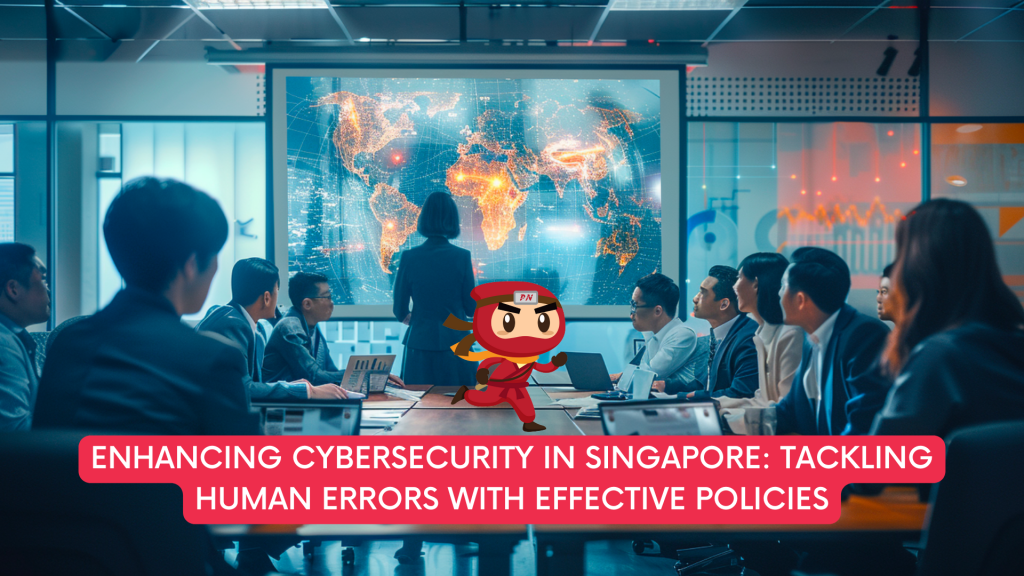
Singapore stands as a beacon of technological advancement and innovation. However, alongside these advancements comes the ever-looming threat of cybersecurity breaches. Despite the implementation of sophisticated cybersecurity measures, human errors continue to undermine the security posture of organizations across the nation.
This article delves into the pervasive issue of human errors in cybersecurity within Singaporean organizations and the critical role of policies in mitigating these risks.
Human errors remain a significant challenge for cybersecurity in Singapore, with organizations facing an array of internal vulnerabilities. From inadvertent data breaches to falling victim to social engineering tactics, the consequences of human error can be severe and far-reaching. These errors often stem from a lack of awareness, negligence, or insufficient training among employees, making organizations susceptible to cyber threats.
One of the most concerning aspects of human errors in cybersecurity is their prevalence in the absence of robust policies. Without clear guidelines and protocols in place, employees may unknowingly engage in risky behaviors, such as clicking on suspicious links or sharing sensitive information, thereby compromising the organization’s security posture.
Addressing these vulnerabilities requires a proactive approach that emphasizes the importance of comprehensive cybersecurity policies.
Effective cybersecurity policies serve as a cornerstone for safeguarding organizations against human errors. These policies outline guidelines, procedures, and best practices that employees must adhere to, thereby reducing the likelihood of security breaches caused by human negligence.
By clearly defining acceptable use of technology, data handling protocols, and incident response procedures, policies empower employees to make informed decisions and prioritize security in their day-to-day activities.
Furthermore, cybersecurity policies play a crucial role in fostering a culture of security awareness within organizations. By promoting education and training initiatives, organizations can ensure that employees understand their roles and responsibilities in maintaining cybersecurity standards.
Regular training sessions and awareness campaigns can help employees recognize potential threats, identify phishing attempts, and respond effectively to security incidents, thereby minimizing the risk of human errors.
In Singapore, where the digital landscape is rapidly evolving, the need for robust cybersecurity policies has never been greater. Organizations must recognize the importance of proactive measures in combating human errors and strengthening their cybersecurity defenses. This entails developing comprehensive policies tailored to the specific needs and challenges faced by each organization.
When crafting cybersecurity policies, organizations should consider factors such as industry regulations, emerging threats, and the unique cybersecurity landscape of Singapore. Collaborating with cybersecurity experts and leveraging industry best practices can help organizations develop policies that are both effective and adaptable to evolving threats.
Additionally, policies should be regularly reviewed and updated to reflect changes in technology, regulations, and organizational requirements.
Human errors pose a significant threat to the cybersecurity posture of organizations in Singapore, but they are not insurmountable. By implementing effective policies and fostering a culture of security awareness, organizations can mitigate the risks associated with human negligence and strengthen their cybersecurity defenses.
In an increasingly interconnected world, the importance of proactive cybersecurity measures cannot be overstated. With the right policies in place, Singaporean organizations can navigate the complex cybersecurity landscape with confidence and resilience.
Your appointed DPO can work with you on your PDPA compliance, ensuring that there will be policies in place to make sure that the handling of personal data is PDPA compliant.
A Data Protection Officer (DPO) oversees data protection responsibilities and ensures that organisations comply with the Personal Data Protection Act (PDPA). Furthermore, every Organisation’s DPO should be able to curb any instances of PDPA noncompliance as it is the officer responsible for maintaining the positive posture of an organisation’s cybersecurity.
DPOs complement organisations’ efforts to ensure that the organisation’s methods of collecting personal data comply with the PDPA. It also ensures that policies are set in place to make sure that there will be no instances of data breaches in the future.
Don’t wait any longer to ensure your organisation is PDPA compliant. Take our free 3-minute PDPA Compliance Self-audit checklist now, the same “secret weapon” used by our clients to keep them on track. Upon completion, we will send you the results so you can take the necessary action to protect your customers’ data. Complete the free assessment checklist today and take the first step towards protecting your customers’ personal data.
Role of Enhanced Access Controls in Safeguarding Personal Data in Telecommunications that every Organisation in…
Effective Incident Response Procedures in Strengthening Data Security that every Organisation in Singapore should know…
Crucial Role of Regular Vulnerability Scanning that every Organisation in Singapore should know. Strengthening Your…
Enhancing Data Security with Multi-Factor Authentication that every Organisation in Singapore should know. Enhancing Data…
Strong Password Policy as a first line of defense against data breaches for Organisations in…
Importance of Efficient Access Controls that every Organisation in Singapore should take note of. Enhancing…
This website uses cookies.